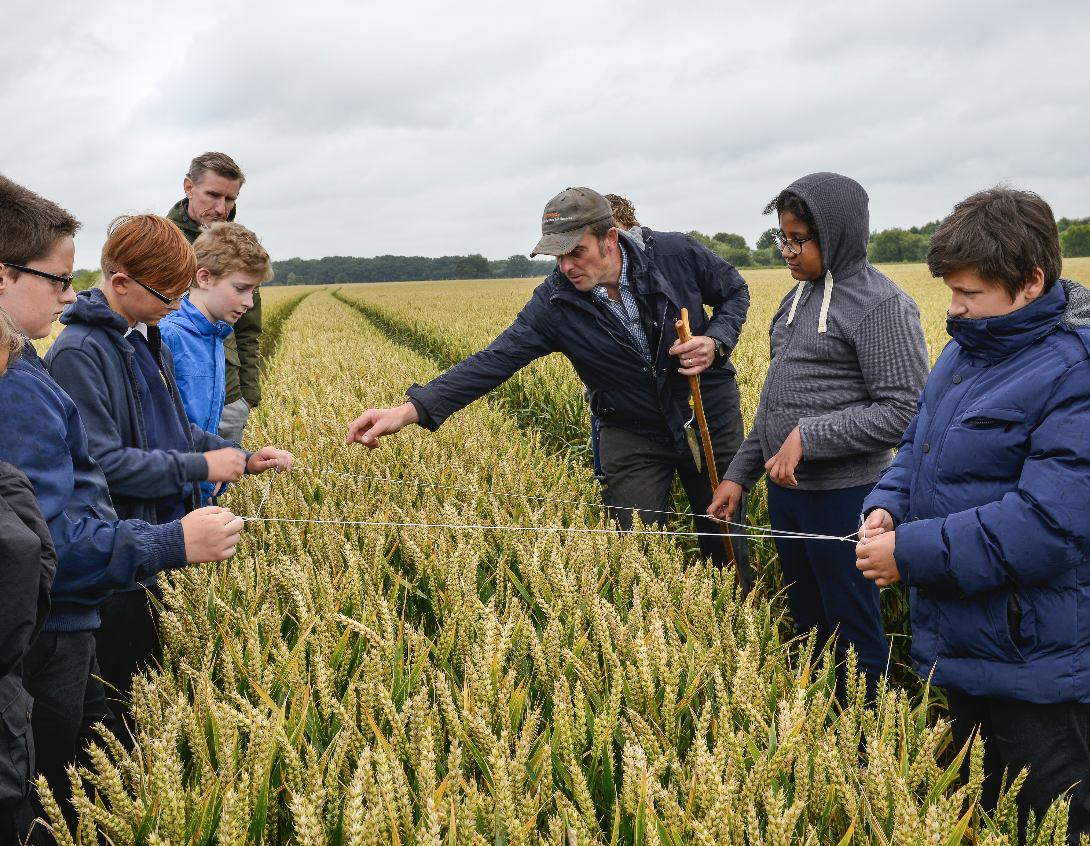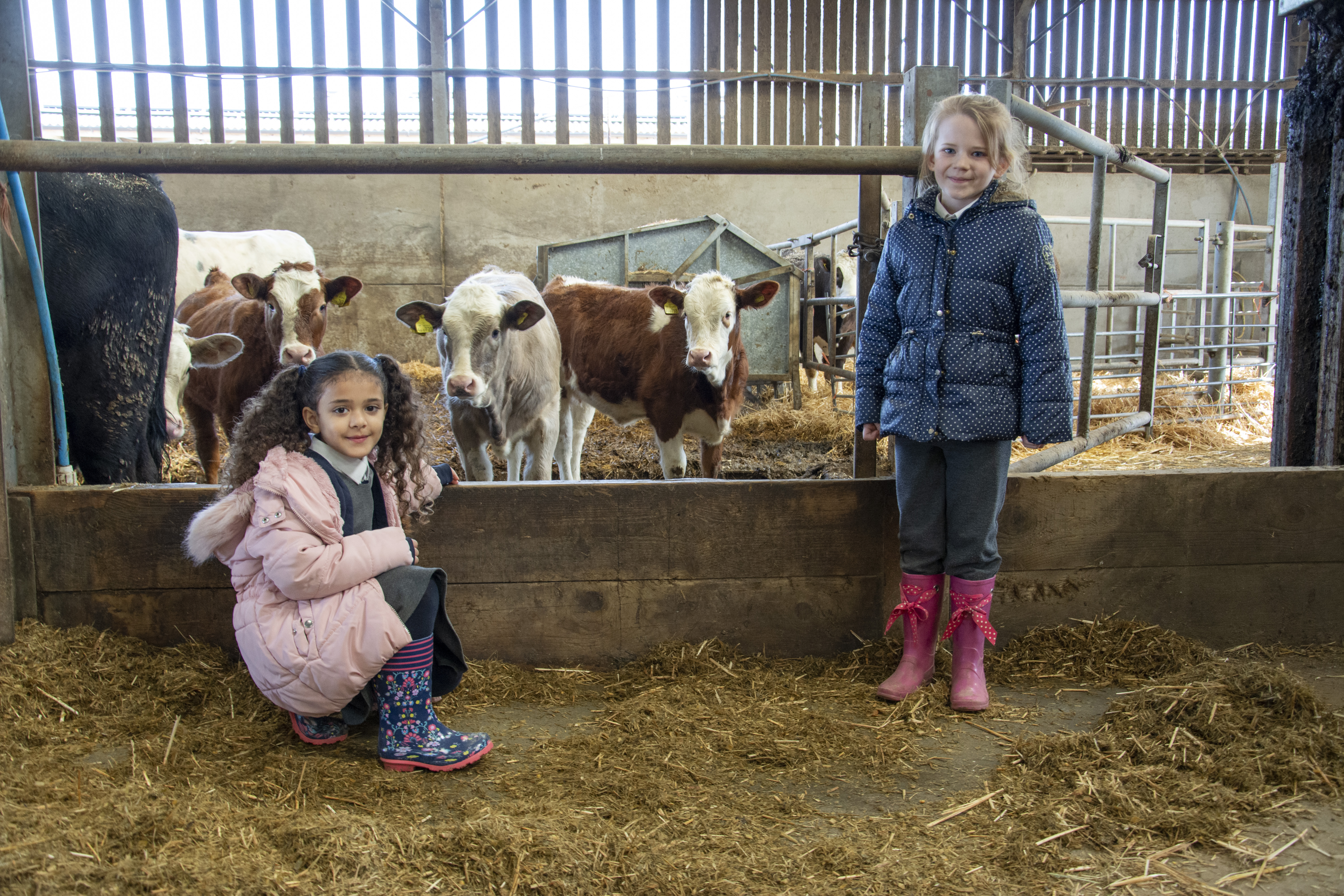




“Many can’t find the ideal house in the countryside, or have been priced out of it, which means they are open to considering a project.”



A perceived disconnect between consumers and what happens in the countryside is often blamed for landowners getting a raw deal when it comes to creating policy or highlighting issues affecting them.
As farms and estates stand on the precipice of enormous change, the importance of creating a wider understanding of land management and food production has come into much sharper focus.
Face-to-face experiences

Farm visits may have ground to a halt during the past two years but, rather than accept defeat, food and farming organisations capitalised on the opportunity to reach children remotely.
“During the first lockdown, food became scarcer and people began
to value it more.”
Off the back of the online success, schools are now pushing for more face-to-face experiences.
Climate change
Climate change is particularly of interest to children, who will undoubtedly be more affected by it than previous generations and play a bigger part in combatting it.
Reconnecting consumers with the countryside

Getting farming on the national curriculum is touted as a simple solution to the problem; the result of which would influence children in the short term but with a long-term aim of building knowledge and understanding among the consumers and policymakers of tomorrow.
But, in reality, making such a change is slow and hard.
The good news is that schools and children are receptive to being educated about the industry, and recent lockdowns have only served to strengthen this interest.



Lockdown learning
More than 200,000 students took part in the NFU’s Science Farm Live in 2021, which provided lessons live from farms during British Science Week, and environmental charity LEAF reported a five-fold increase in engagement with its educational activities.
“During the first lockdown, food became scarcer and people began to value it more,” says Carl Edwards, Director of Education and Public Engagement at LEAF.
“On top of that, accessing the natural environment became much more of a treat for people, so there was greater value placed on that too. This was compounded by issues around mental health and wellbeing, and schools suddenly became interested in all of the topics we cover, much more than ever before.”
Although numbers are important, Carl is adamant that quality is just as important as quantity. “For us, it’s also about the amount of time we spend with those young people, and whether we actually have an impact,” he adds.
LEAF’s work has made a tangible difference; more than 36% of the students who participated in its National Food, Farming and Environment competition were so inspired that they went on to study at land-based colleges.

“Many won’t have been to the British countryside before”
The Country Trust aims to give disadvantaged children the opportunity to learn about food, farming and the countryside.
The team takes around 900 children from deprived areas of London, Leeds and Bradford to the countryside every year for residential stays incorporating visits to working farms, trips to the beach and activities such as pony trekking.
“Most of the children who take part haven’t been away from home before,” says Country Trust CEO Jill Attenborough. “Many won’t have been to the British countryside before; a lot will never have had a natural surface underneath their feet.
“The social and emotional wellbeing aspects of visits is especially important right now because urban children have been cooped up for a very long time with no access to green space.”
Educating urban children
Ensuring that urban children have access to educational resources about farming and the countryside is vital.
“As an industry, we have to have a mandate for inclusivity and diversity within agriculture,” Josh Payne, Chief Education Manager at the NFU, says.
“A lot of policy change and consumer habits are driven from these areas – the more disconnected these people get from food, the more accepting they are of eating anything such as food from third-party food delivery services or pre-cooked meals.”
Carter Jonas client Englefield Estate transforms itself into an impressive outdoor classroom every year during its schools days.
Over two days, thousands of children from more than 50 primary schools are welcomed on site to learn more about farming, horticulture and forestry.
“We invite the most urban schools we can because it’s important we provide the opportunity to those young people, who may never have seen a cow before,” says Dr Liz Mattison, Community and Education Officer at Englefield Estate.
The estate has been inviting children from a range of schools across Berkshire and neighbouring counties to its events to learn more about Englefield and what makes the countryside a great place to live, work and enjoy since 1997.
Such access is arguably more important than ever, as city dwellers become more and more removed from the realities of food production.
“As children grow into adults, they need to be able to make informed decisions,” says Liz. “These children are facing issues we simply didn’t have to deal with when we were kids and they’re going to be adults in a very different world, where concerns about air quality, soil, water, food security, pests and diseases and carbon footprint are going to be a really big part of their lives.
“We’re not going to be able to import everything we need because it won’t be sustainable. So these children will need to consider what is in season and what is available locally much more than we do. Getting the ball rolling early and helping them think about where their food comes from will help this as they grow up.”
Jill agrees that providing children with information about food and farming will give them practical experience to remember when they’re older and shopping at a supermarket.
“They will think ‘I’ve been to a place that produces things like that’ or ‘I’ve cooked with that vegetable’. They might know how it relates to their health, or that soil is important, or that farmers can make a big difference to climate change.
“Personal practical experience will help them make these day-to-day decisions; tiny little steps can create connections with the big issues we’re all facing.”
Estates potentially have a significant part to play in children’s education, particularly as food and farming doesn’t feature heavily on the national curriculum.
“The word ‘sustainability’ doesn’t feature in the national curriculum at all,” says Liz.
“The number one thing that we get asked about by children at the moment is climate change,” says Josh.
“We did some live lessons during COP26 for secondary school students, teaching them about the link between farming and climate change and trying to myth bust around the impact of climate change, both from farming and on farmers and the farming community.
“We wanted to show the difference between British systems and the rest of the world and show students that a pint of milk could have a very different carbon footprint depending on where in the world it has been produced.”
An event last year attracted so many questions about climate change from primary school pupils that a whole lesson has been created solely to discuss the effects of climate change.

Safeguarding future of estates
As well as safeguarding the future of farming, liaising with children is also essential to preserving the lifespan of an estate.
“There are eight primary schools either within or around Englefield Estate,” says Liz. “All of these children grow up walking in our woods, learning about the countryside code, and that’s absolutely vital.
“They become friends of the estate – they know what to do if they see a cow in trouble. They won’t start fires. It’s a two-way relationship that benefits us both.”
“It’s all about paying it forward,” says Carl from LEAF Education. “You might not see a result tomorrow. But in a couple of years’ time, when we have a more aware and educated society, then it will have paid off.”
HOW TO PLAY YOUR PART
The opportunities are numerous for farmers and landowners looking to help educate the next generation.
The NFU’s Farmers for Schools initiative will be formally relaunched during the NFU’s Conference in February, with farmers being provided with training with a view to them delivering assemblies in schools by summer this year.
LEAF provides CEVAS training which covers everything from how to handle contentious issues to activities farmers can provide.
And the Country Trust is actively looking for farmers and growers willing to host farm visits for primary schools.


















Sign-up to receive content like this

Sign-up for to receive content like this
